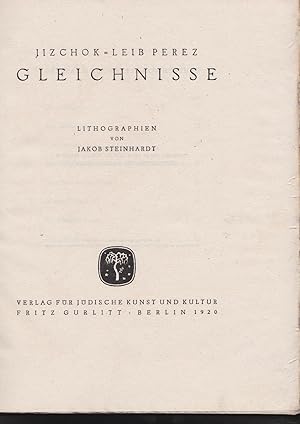Descripción
88, [1] pages. 30 x 24 cm. In German. Soiled boards. Bold inscription from 1923, in German in a stylish bold hand on the front blank. Eight short stories (Zwei Wege, Der Glasscherben, Der Kolonist, Die vierfarbige Laterne und die vier kleinen Hunde, Vom Irren in der Wüste, Messias Zeiten, Ein Chanukkatraum, Die Schwalben.) by Jewish writer Isaac Leib Peretz, translated from Yiddish into German by Alexander Eliasberg and illustrated with 9 lithographs, inclusive of the frontispiece, by the German-Jewish (later Israeli) artist Jacob Steinhardt. Jakob Steinhardt (1887-1968) was a German Expressionist who was a master in graphic works, especially etchings and woodcuts depicting biblical and other Jewish subjects. He founded the Pathetiker Group in 1912 and participated in the Sezession. When the Nazis came to power in 1933 he immigrated to Israel. In 1948 he became chairman of the Graphics Department at the Bezalel Academy of Art and Design. Jizchok Leib Perez (1852-1915) was the greatest men of letters who wrote in Yiddish. He was a novelist, poet, and playwright. Isaac Leib Peretz (Polish: Icchok Lejbusz Perec, (May 18, 1852 - 3 April 1915), also sometimes written Yitskhok Leybush Peretz, best known as I. L. Peretz, was a Yiddish language author and playwright from Poland. With Mendele Mokher Seforim and Sholem Aleichem he was one of the three great classical Yiddish writers. He was ?the great awakener of Yiddish-speaking Jewry. . . aroused in his readers the will for self-emancipation, the will for resistance. . ." Peretz rejected cultural universalism, seeing the world as composed of different nations, each with its own character. He saw his role as a Jewish writer to express "Jewish ideals. . . grounded in Jewish tradition and Jewish history." Unlike many other Maskilim, he greatly respected the Hasidic Jews for their mode of being in the world; at the same time, he understood that there was a need to make allowances for human frailty. His short stories emphasize the importance of sincere piety rather than empty religiosity. Born in the city of Zamo??, Lublin Governorate, Congress Poland, and raised in an Orthodox Jewish home he gave his allegiance at age fifteen to the Haskalah, the Jewish enlightenment. He began a deliberate plan of secular learning, reading books in Polish, Russian, German, and French. He planned to go to the theologically liberal Rabbinical school at Zhytomyr, but concern for his mother's feelings got him to stay on in Zamosc. He failed in an attempt to make a living distilling whiskey, but began to write Hebrew language poetry, songs, and tales, some of them written with his father-in-law. He passed the examination to become a lawyer, a profession which he successfully pursued for the next decade, until in 1889 his license was revoked by the Imperial Russian authorities due to of suspicion of his harboring Polish nationalist feelings. From then on he lived in Warsaw, where his income came largely from a job in the small bureaucracy of the city's Jewish community. There he founded Hazomir (The Nightingale), which became the cultural centre of pre-World War I Yiddish Warsaw. A writer of social criticism, sympathetic to the labor movement, he wrote stories, folk tales and plays. He was both a realist and a romanticist. While most Jewish intellectuals were unrestrained in their support of the Russian Revolution of 1905, Peretz's view was more reserved, focusing more on the pogroms that took place within the Revolution, and concerned that the Revolution's universalist ideals would leave little space for Jewish non-conformism. N° de ref. del artículo 008506
Contactar al vendedor
Denunciar este artículo
Detalles bibliográficos
Título: Jizchok Leib Perez GLEICHNISSE [ = Parables]...
Editorial: Verlag für Jüdische Kunst und Kultur, Fritz Gurlitt, Berlin, Germany
Año de publicación: 1920
Encuadernación: Hardcover
Ilustrador: Steinhardt, Jakob [Lithographs] (1887-1968).
Condición: Very Good
Condición de la sobrecubierta: No Jacket
![]()




